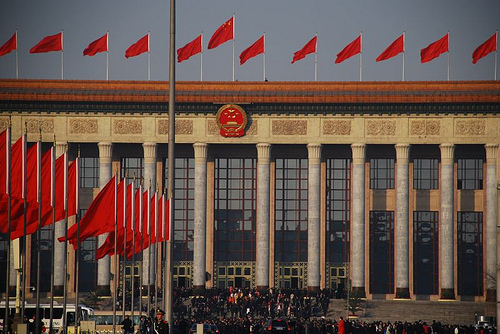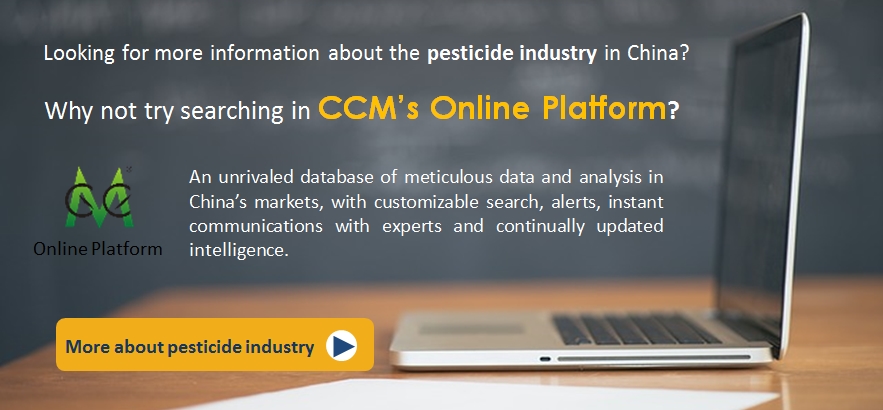China’s
pesticides market will continue growing in 2018, driven by updated processing
technology and market consolidation. Large enterprises will profit the most in
2018 and more pesticides are getting banned. Foreign traders of Chinese
pesticides will face good opportunities to bring the products under trusted
brand names to international markets and benefit from the growing demand
worldwide.

According
to market intelligence firm CCM, the pesticides industry in China will continue
rising in 2018, supported by the elimination of further excessive production
capacity and outdated enterprises. This will lead to an upgrading of the
industry domestically and enhance the competition in international pesticides
markets.
Overall,
China's pesticide use has dropped in the past three years constantly. The
middle kingdom has announced in 2015 the goal to achieve zero growth in the
number of pesticides used by 2020, and, according to official reports, it has
already seen negative growth over the last three years, likely to continue in
the future.
It
might be only a matter of time for the second round of price hikes to arise
throughout the Chinese pesticide technical market, given the tightening market
supply, increasing global demand, and supports from the new pesticide policies
in the country. After all, Chinese pesticide producers have been facing
increasing production costs in China, which results from the increased
environmental pressure by the government, conducting regular inspections.
Environmental
regulations have posed significant impacts on domestic pesticide industry in
2017. China's environmental policies always work well in regulating the market.
Stringent administration helps cut out small-sized or even unlicensed producers
and favours the development of leading enterprises.
Since
H2 2016, the central government has started four rounds of environmental
inspection across the country. This will help eliminate outmoded capacity and
enterprises that have substandard environmental protection equipment or unable
to afford environmental equipment upgrading. As a result, the supply side will
be further optimised.
What’s
more, by 2025, hazardous chemical producers that do not meet safety standards
have to move into designated industrial parks in China or shut down their
facilities. This regulation is likely to affect the supply of pesticide
intermediates in China for 2018, as small- and medium-sized enterprises, as
well as large enterprises with major potential risks, have to start relocation
before 2018 and finish before the end of 2020, according to CCM’s research.
Large enterprises will
shine in 2018
The
year 2018 will benefit the Chinese pesticides manufacturers that already have
upgraded their production processes and are in possession of a highly integrated
supply chain, able to generate their needed raw materials by themselves to
avoid high purchase costs.
Hence,
leading enterprises in this industry are going to have more power in the market
as environmental inspections and safety inspections become a normal routine in
the foreseeable future. The main advantages of large pesticides enterprises are
the self-sufficiency in raw materials and the resulting independence of market
voluntarily, the implementation of new national standards for pesticides to fight
fake and counterfeit products, as well as big overseas markets with growing
demand and already existing clients.
Two new pollution laws
in 2018
On
January 1, 2018, the Water Pollution Prevention and Control Law will be
enforced officially. Besides increasing some rules and improving related
contents, it also strengthens the punishment of illegal water emission. Minor
violation will be fined with production suspension and monetary fines, for a
severe violation, the business may be shut down.

On
the same date, China’s first Environmental Protection Tax Law of the People’s
Republic of China will be enforced. So far, the applicable tax standards have
been determined across the country and levies are ready. After the policy
implementation, enterprises with air and water pollutant emissions will be
affected negatively. According to the law, enterprises, institutions and other
business operators shall pay taxes if they directly discharge taxable
pollutants into the environment.
More toxic pesticides
will be banned
All
highly toxic pesticides should be banned in China within five years. According
to CCM, there are 12 high-toxicity pesticides now in China. The government
looks to improve the safety of its farm produce with this measurement.
As
a fact, China has already withdrawn 22 highly toxic pesticides from use so far,
and it prohibits the use of any such products on fruit, vegetables and tea.
Three
pesticides will be banned in the coming year, namely aldicarb, phorate
and isocarbophos. However, the bans will likely have limited impact on the
industry, as the pesticides marked for phaseout comprise only a very low
percent of annual pesticide production in China.
China
may be aiming to achieve more regulatory alignment with the European Union as a
way to make trade easier between the two economies.
Huge opportunities for
foreign traders of Chinese pesticides
According
to CCM, China’s pesticides industry is facing a bunch of challenges that will
continue to put pressure on enterprises in 2018. Overall, the recovery of the
global economy will still be a major support to domestic supply.
As
China is the largest pesticides exporter worldwide, the country is depending
highly on the development of global markets and the demand for agrochemicals.
Especially small enterprises have an uncertain future in China, not able to
update their production and waste disposal technology to the required standards
and lacking overseas clients for sufficient profitably of their sales. Hence,
mergers and acquisitions will continue throughout China’s pesticides companies
in 2018.
Due
to the low quality of Chinese pesticides formulation and high barriers to enter
overseas markets with own pesticide brands, traders are still one of the main
purchasers of Chinese pesticides, mostly pesticides technical, to process them
into higher quality pesticides formulations and sell them under
well-established brands in their respective markets.
Hence,
foreign traders have a great opportunity to collaborate with Chinese pesticide
manufacturers and sell their products under local names. Especially traders
with a good distribution network can profit highly from bringing the Chinese
products in the local market, creating a win-win situation for Chinese
manufacturers and themselves.
Notably,
China may be aiming to achieve more regulatory alignment with the European
Union as a way to make trade easier between the two economies.
About this article
More
information on this article and China’s pesticides market can be found in CCM’s Newsletter and industrial reports. CCM is China’s leading market intelligence
provider for the fields of agriculture, chemicals, and food & feed.
You
can find comprehensive market research in CCM’s pesticide database as well.
Please click on the links to check the different services of CCM or contact the
team directly by emailing econtact@cnchemicals.com or
calling 86-20-37616606.
As
a Christmas special, new users can get a 20% discount on any online
purchase of CCM’s products. Don’t miss your chance for the limited offer.